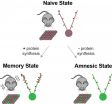(Press-News.org) Retrograde amnesia is the inability to recall established memories. In humans, amnesia is associated with traumatic brain injury, Alzheimer's disease, and other neurological conditions. Whether memories lost to amnesia are completely erased or merely unable to be recalled remains an open question. Now, in a finding that casts new light on the nature of memory, published in Science, researchers from the RIKEN-MIT Center for Neural Circuit Genetics demonstrated in mice that traces of old memories do remain in the amnestic brain, and that the cellular pathways underlying them can be reactivated, allowing lost memories to be found.
The research team, led by Susumu Tonegawa, Director of the RIKEN Brain Science Institute in Saitama, Japan, was interested in how stable memories are formed in the brain and whether memories whose storage was disrupted by chemically inducing retrograde amnesia, could still be recalled. "Brain researchers have been divided for decades on whether amnesia is caused by an impairment in the storage of a memory, or in its recall," said Tonegawa.
To make mice amnestic, they were first trained to associate a mild foot shock with a specific environment, chamber A, eliciting a typical "freezing" behavior. Eventually, trained mice would freeze in chamber A even without the shock. Neurons activated during memory formation were genetically labeled to allow their visualization and reactivation. Then, some mice were given a chemical, anisomycin, which inhibits new protein synthesis and prevents increases in synaptic strength important for memory encoding, thus inducing retrograde amnesia. Other mice received saline as a control. As expected, amnestic mice returned to chamber A did not freeze, indicating that they could not recall the memory for the specific association of the chamber and the mild foot shock.
Next, to investigate whether the stored memory from the foot shock training in chamber A was absent from the amnestic mice or remained present but was not retrievable, the researchers used optogenetic technology to selectively activate neurons that were genetically labeled during their training in chamber A with a blue light-sensitive protein, channelrhodopsin, but this time while the mice were in a novel, neutral environment, chamber B. Surprisingly, during activation of the cells involved in the foot shock memory, collectively called a "memory engram", with blue light pulses, the amnestic mice froze just as much as the control mice, indicating that they remembered that they had acquired the memory, even though they could not recall it when placed in chamber A.
To explain how the "lost" memory was recalled during light stimulation of the memory engram, despite the induction of retrograde amnesia, the authors suggest that different processes may control memory encoding and recall. For example, during the training period, brain connections between unique memory engrams in neighboring brain structures may be strengthened and once this has occurred, may not require an increase in synaptic strength in order to store, but not recall, the contextual fear memory and would be preserved in the amnestic state. Indeed, they observed that connectivity was enhanced between memory engram cells in the fear memory-holding amygdala and context memory-holding hippocampus of amnestic mice, even though synaptic changes remained stable.
"Our conclusion," says Tonegawa, "is that in retrograde amnesia, past memories may not be erased, but could simply be lost and inaccessible for recall. These findings provide striking insight into the fleeting nature of memories, and will stimulate future research on the biology of memory and its clinical restoration."
INFORMATION:
Elevated plasma triglyceride level is considered a risk factor for type-2 diabetes, but new findings suggest that a genetically-elevated triglyceride level is associated with protection against type-2 diabetes. Yann Klimentidis, an Assistant Professor at the Mel and Enid Zuckerman College of Public Health at the University of Arizona, and colleagues found that triglyceride-increasing alleles are associated with decreased type-2 diabetes incidence. Their findings were published recently in PLOS Genetics.
Building on previous studies that hinted to the same association, ...
Dany Gaillard and colleagues at the University of Colorado Anschutz Medical Campus have discovered a key molecular pathway that aids the renewal of taste buds, a finding that may help cancer patients suffering from an altered sense of taste during treatment. Their findings were published recently in the journal PLOS Genetics.
"Many cancer drugs which circulate throughout the entire body, will target a tumor but in the process affect healthy cells," said the study's senior author Linda Barlow, a professor of cell and developmental biology at University of Colorado Anschutz ...
AURORA, Colo. (May 28, 2015) - Researchers at the University of Colorado Anschutz Medical Campus have discovered a key molecular pathway that aids in the renewal of taste buds, a finding that may help cancer patients suffering from an altered sense of taste during treatment.
"Many cancer drugs, which circulate throughout the entire body, will target a tumor but in the process affect healthy cells," said the study's senior author Linda Barlow, PhD, professor of cell and developmental biology at CU Anschutz. "That in turn will alter a person's sense of taste leading to ...
CAMBRIDGE, MA -- Memories that have been "lost" as a result of amnesia can be recalled by activating brain cells with light.
In a paper published today in the journal Science, researchers at MIT reveal that they were able to reactivate memories that could not otherwise be retrieved, using a technology known as optogenetics.
The finding answers a fiercely debated question in neuroscience as to the nature of amnesia, according to Susumu Tonegawa, the Picower Professor in MIT's Department of Biology and director of the RIKEN-MIT Center at the Picower Institute for Learning ...
This news release is available in Japanese.
Long-held social biases can be reduced during sleep, a new report suggests. It adds further support to recent research that has shown that memories can be selectively reactivated and strengthened during slumber. Scientists have known that sleep boosts memory formation by resuscitating faint neuron activity shaped during earlier periods, when an individual was awake. This process can be experimentally stimulated by giving a sleeping individual cues related to an earlier period of learning. Now, Xiaoqing Hu and colleagues ...
This news release is available in Japanese. Xiaochun Qin and colleagues have provided a high-resolution crystal structure of a plant protein supercomplex critical to photosynthesis, shedding new light on how this extremely effective solar energy converter achieves its impressive performance. The photosynthesis of many plants relies upon the large light-harvesting complex I (LHC1), which surrounds photosystem I (PSI) and captures sunlight. LHC1 is able to transfer the energy it absorbs to the PSI core, where it is converted into chemical energy with close to 100% efficiency. ...
This news release is available in Japanese.
Memories that have been destabilized and forgotten by mice can nevertheless be retrieved by activating memory engrams, or specific patterns of neurons that fire when memories are encoded, with light, researchers say. These findings provide fresh insight into memory consolidation, or the process by which new, unstable memories transform into stable, long-term memories. Until now, researchers have wondered whether memory consolidation was dependent upon the stabilization of these memory engrams. But Tomás Ryan and colleagues ...
This news release is available in Japanese.
Armadas of icebergs that broke off the Greenland ice sheet into the northern Atlantic Ocean during the Last Glacial Period -- between about 110,000 and 12,000 years ago -- often increased methane production in the tropics, according to a new study. These findings illustrate how high-latitude events can influence tropical climate conditions, and they hint at the underlying mechanisms of abrupt climate changes. Such massive discharges of icebergs into the Atlantic are known as Heinrich Events, and researchers have wondered for ...
CHICAGO --- HIV has a voracious sweet tooth, which turns out to be its Achilles' heel, reports a new study from Northwestern Medicine and Vanderbilt University.
After the virus invades an activated immune cell, it craves sugar and nutrients from the cell to replicate and fuel its wild growth throughout the body.
Scientists discovered the switch that turns on the immune cell's abundant sugar and nutrient pipeline. Then they blocked the switch with an experimental compound, shutting down the pipeline, and, thereby, starving HIV to death. The virus was unable to replicate ...
Zoonotic malaria has been shown to be caused by two genetically distinct Plasmodium knowlesi parasite subpopulations associated with different monkey host species in Malaysia, according to new research published in PLOS Pathogens. The authors believe this could have important implications for how the parasite adapts and spreads in humans.
Plasmodium knowlesi is a zoonotic malaria parasite which is common in forest-dwelling macaques. In recent years, increasing numbers of cases of knowlesi malaria have been reported in humans. The disease is now the most common form of ...


